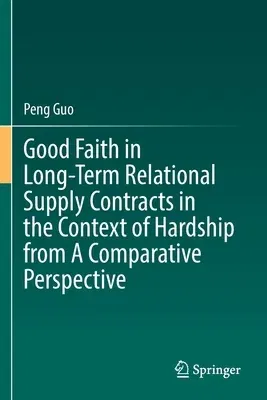Chapter 1: This chapter introduces the book and summarises the contents
of each part. It states a hypothesis that a new principle of pacta sunt
servanda bona fide, based on relational contract theory, is emerging in
international trade, where hardship issues arise in performing long-term
relational supply contracts. The main proposition is that in the context
of hardship, the parties to a long-term relational supply contract have
a duty to renegotiate the contract unless there is a 'compelling reason'
not to do so. Additionally, the judges or arbitrators have the power to
adapt the contract based on good faith, the relational nature, and the
characteristics of the contract. Where there is a complete breakdown of
the ongoing contract relationship or the adaptation will cause one or
the adaptation will rewrite the contract, the judges or arbitrators have
the power to terminate it.
Chapter 2: Chapter Two will examine the nature and characteristics of
long-term contracts and long-term relational supply contracts in
particular. A definition of a long-term relational contract is also
proposed. To refine the scope of the book, and to make the arguments
stronger and more acceptable, Chapter Two will emphasise the extent to
which the book concentrates on long-term relational supply contracts in
the ensuing chapters.
Chapter 3: Chapter Three will discuss the different mechanisms relating
to hardship in the selected domestic laws, in the CISG and in the
UNIDROIT Principles. The chapter will demonstrate that good faith is
often applied when dealing with hardship issues.
Chapter 4: Chapter Four will investigate good faith in domestic laws,
the CISG and the UNIDROIT Principles, to address how it is applied to
deal with hardship issues and why good faith is not applied in English
law and Australian law. It will argue that the many facets and levels of
good faith make it an appropriate tool for tackling issues relating to
long-term relational supply contracts in the context of hardship.
Chapter 5: Chapter Five will first address the concrete manifestations
of good faith in long-term contracts under the UNIDROIT Principles. It
will then identify the gaps and vagueness in the rules underlying the
UNIDROIT Principles. Recognising that the book's ultimate goal is not to
design a totally new set of rules in respect of hardship, this chapter
will present suggestions on how to improve the quality, and promote the
application of, the hardship rules provided by the UNIDROIT Principles.
It will suggest how to address the shortcomings and dispel the vagueness
surround the hardship issue from both substantive and procedural
perspectives. This chapter also proposes a double-construction approach
and suggests a list of factors that should be taken into account by the
courts or arbitral tribunals in determining whether the parties have
acted in good faith.
Chapter 6: Chapter Six will analyse the importance and necessity of a
relational and a good faith understanding of hardship rules in
international trade in the future. It will detail why extending the
principle of pacta sunt servanda to pacta sunt servanda bona fide is
innovative and how it can redress the problems associated with hardship
identified in the foregoing chapters.

